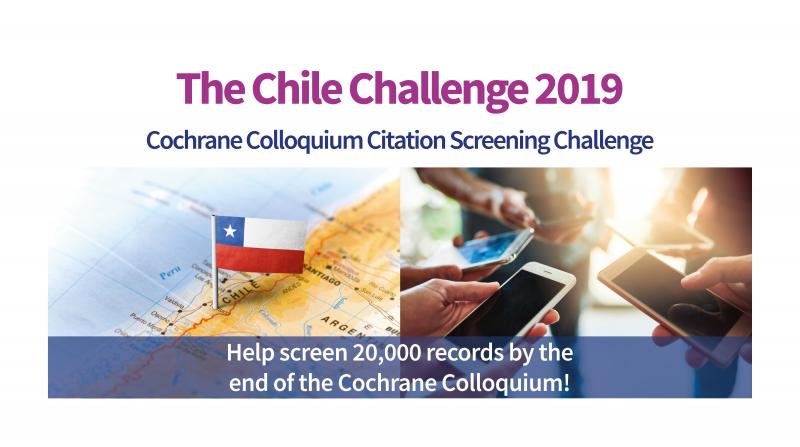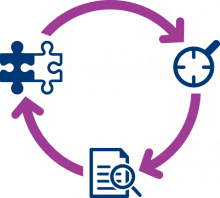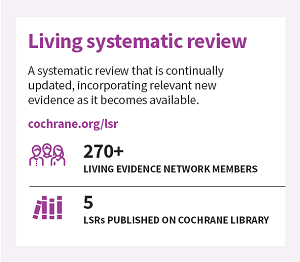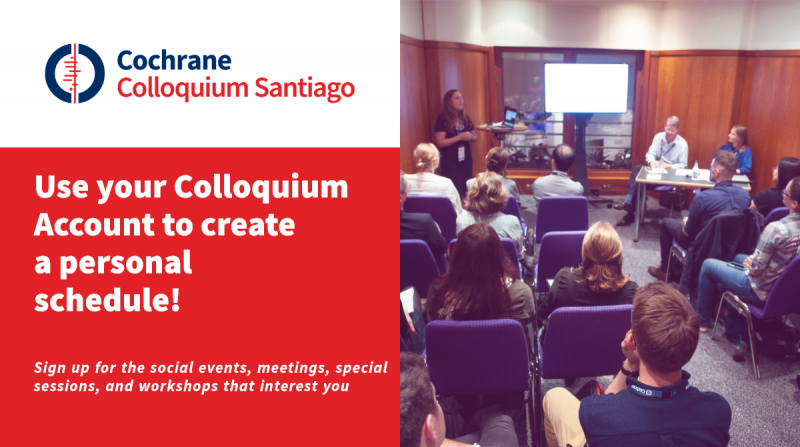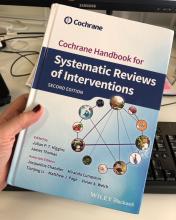Important Update: Colloquium Cancelled

*******Cochrane Santiago Colloquium cancelled - Latest Update: Friday 25 - 15:00
There is 11pm to 4am curfew this evening in Santiago
Update: Thursday 24 - 15:00 - 20:00
There is a 10pm to 5am curfew this evening in Santiago
Delegates returning home have reported that many shops and restaurants at the airport are open.
Update: Wednesday 23 - 15:00
There is a 10pm to 5am curfew this evening in Santiago
Update: Tuesday 22 October - 23:00
There is a planned 2-day strike tomorrow. This should not affect planned transfers to the airport or airport operations, however most businesses will be closed.
Update: Tuesday 22 October - 17:00
There is a 20:00 to 05:00 curfew this evening in Santiago.
Update: Tuesday 22 October - 14:15
There is a peaceful march in Parque Araucano, about 1 km from the Hyatt Place Vitacura. It is peaceful now, but we recommend delegates avoid this area.
Update: Tuesday 22 October - 12:20 pm - Airport busy!
Information for friends still in Chile for #CochraneSantiago: we recommend getting to the airport with lots of extra time, as it is quite busy given the current situation. Additionally, if possible, it is recommended to bring some food with you, as some airport restaurants have limited supplies.
Update: Tuesday 22 October - 10:00 am - A message of thanks from Dr. Gabriel Rada and the Local Organizing Committee
Chair of the Local Organizing Committee and Co-Director of Cochrane Chile, Gabriel Rada, expresses his thanks for everyone’s support this week. Please watch the video message.
Update: Monday 21 October - 16:00
There is a curfew 20:00 to 06:00 this evening in Santiago.
Update: Monday October 21, 12:30 pm
We want to provide updated information regarding the situation of civil unrest in Santiago and other cities across Chile.
We can report that the city has been a little calmer in recent hours and some public transport has re-opened. However, many businesses and supermarkets remain closed, and there continues to be military presence across large parts of the city. Similar to previous evenings, a curfew is expected in Santiago tonight; we will update the information regarding these curfew times as soon as we receive confirmation.
Since we announced the cancellation of the Colloquium yesterday, those delegates en route to Santiago have arrived and reached their accommodation safely. We continue to recommend that delegates who are here should please stay near to your hotel, ask your hotel reception for any advice regarding facilities in the local area, opening times of supermarkets and shops, and public transport updates. Please ensure you are aware of daily curfews and stay safe. If you are in Chile and have not yet let us know your whereabouts, please send us a short email with information about your accommodation (hotel, Air BnB, etc.) and your contact details (mobile phone number) so that we can have a better understanding of which delegates have arrived and where they are staying.
Some delegates have been able to reschedule flights to leave Chile earlier than planned. The airport continues to function, although it is far busier than normal, and the road to the airport is open and clear as far as we know. You are still advised to check your flight schedule and booking with your airline before you travel.
If you have specific concerns and questions today, you can email us at colloquium@cochrane.org; or phone (or WhatsApp) these support lines: +44 7539 997-549 / +44 7984 421-980.
Our Local Organizing Committee are working on plans to digitalize some of the key Colloquium content that was planned for the week, and more information about how this will be implemented will be shared here soon.
Local Organizing Committee
Update: Sunday 20 October - 17:00
There is a curfew 19:00 to 06:00 this evening in Santiago.
Sunday 20 October: Update – 11:00 – COLLOQUIUM IS CANCELLED
Due to the worsening situation of civil unrest across the city of Santiago, the decision has been taken to cancel this year’s Cochrane Colloquium.
The situation in the city centre has deteriorated in the last 24 hours and remains volatile and uncertain: a curfew is in place, there is extremely limited public transportation and there are reports of a two-day national strike beginning on Monday.
The safety and security of all Colloquium delegates is our highest priority. For this reason, we believe cancelling this year’s annual event is the most appropriate decision.
The Colloquium in its entirety has been cancelled, this includes all pre and post-Colloquium events, workshops, meetings, social events and the Gala dinner.
Clearly, these are challenging times and we would like to provide delegates in Santiago, or in transit to the city, with the following advice:
- If you have arrived, please stay near to your hotel, ask your hotel reception for any advice regarding facilities in the local area, opening times of supermarkets and shops, and public transport updates. Please ensure you are aware of daily curfews and stay safe.
- If you are currently traveling to Santiago, or in transit, we can report that the airport is open but understandably busier than normal. We advise that you make your way to your accommodation using the official transfer operator, DELFOS. You will find them in the main concourse section at Exit Four after leaving baggage claim. In addition, there are members of the local organizing team wearing Cochrane T-shirts at the airport offering advice and support during the day.
- If you already in Santiago, please send us a short email with information about your accommodation (hotel, Air BnB, etc.) and your contact details (mobile phone number) so that we can have a better understanding of which delegates have arrived and where they are staying.
The situation is fast-changing and we are uncertain as to how events will develop. However, hotels and some shops are open, Uber and taxi providers are operating across the city during the day. We recommend that you stay close to your accommodation and seek the advice of local staff.
We are continuing to monitor the situation closely and will provide regular updates.
If you have specific concerns and questions today, you can email us at colloquium@cochrane.org; or phone (or WhatsApp) these support lines: +44 7539 997-549 / +44 7984 421-980.
Our Local Organizing Committee are responding to all enquiries.
We are sorry to have had to cancel our annual flagship event, and recognize the huge disappointment and inconvenience that this will cause. Nevertheless, we are convinced that for the safety and wellbeing of everyone this is the right decision.
Gabriel Rada Mark Wilson Martin Burton Catherine Marshall
Cochrane Chile CEO Co-Chair Co-Chair





